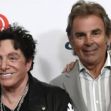Two months after Jane’s Addiction was rocked by a $10 million lawsuit filed by Dave Navarro, Eric Avery, and Stephen Perkins against frontman Perry Farrell, the singer has officially responded. In a new legal filing, Farrell denies liability and outlines 35 affirmative defenses, escalating an already bitter dispute that has put one of alternative rock’s most influential bands in turmoil.
Farrell’s response leans heavily on technical arguments. Among his defenses, he claims Navarro acted with “unclean hands,” that the lawsuit “fails to state facts sufficient to constitute a cause of action,” and that the plaintiffs did not take adequate steps to reduce their alleged damages. Farrell also asserts that his conduct toward Navarro was carried out “in good faith and without malice.” Beyond contesting the claims, he is seeking reimbursement for attorney fees and legal costs.
The filing highlights the fractured dynamic between Farrell and his bandmates, who just last year embarked on what was supposed to be a triumphant reunion tour.
In July, Navarro, Avery, and Perkins filed suit against Farrell in Los Angeles Superior Court. The complaint accused the frontman of assault, battery, negligence, breach of fiduciary duty, and breach of contract. At the heart of the lawsuit is a September 2024 onstage altercation in Boston, where Farrell punched Navarro mid-performance during “Ocean Size.” Video of the incident quickly spread online, sparking public scrutiny and leading to the cancellation of the band’s U.S. dates.
The plaintiffs’ 36-page complaint paints a picture of a group irreparably damaged by Farrell’s behavior. “The Band can no longer function as a result of the Defendant’s conduct, including his sudden, violent outbursts and demonstrated inability to serve as the Band’s frontman and vocalist,” the document states. It argues that Farrell’s actions inflicted “physical, emotional, and financial harms” on his bandmates and their families.
The legal drama stands in stark contrast to how the reunion began. The 2024 tour was the first time since 2010 that all four original members had performed together. Navarro, speaking to Rolling Stone at the time, described the concerts as a chance to explore new textures and experiment beyond the band’s classic hits. Early European shows were warmly received, with critics praising the group’s raw chemistry and sonic ambition.
But once the tour reached the U.S., Farrell’s erratic behavior became impossible to ignore. At a New York City show in early September, he appeared disoriented, struggled to deliver vocals, and spoke incoherently to the crowd. Three days later, the Boston incident occurred. Farrell issued a public apology afterward, admitting he had reached a “breaking point” and describing his outburst as “inexcusable.”
Farrell’s legal team has framed the lawsuit as a strategic move by the other members to control public perception. “This is yet another clear example of the group uniting to isolate and bully frontman Perry Farrell,” attorney Miles Cooley said in a statement. He argued the timing of the lawsuit was “no coincidence,” suggesting it was filed only after Navarro, Avery, and Perkins became aware of potential legal action from Farrell’s side.
The plaintiffs’ attorney, Christopher Frost, pushed back, “Our lawsuit speaks for itself. So does the video,” he said in a statement to Rolling Stone. Frost criticized Farrell’s response as an attempt to delay proceedings rather than address the substance of the claims.
In the months since the altercation, both sides have hardened their positions. Navarro, speaking to Guitar Player in May, declared that the incident “forever destroyed the band’s life,” adding there was “no chance” of the lineup ever performing together again.






